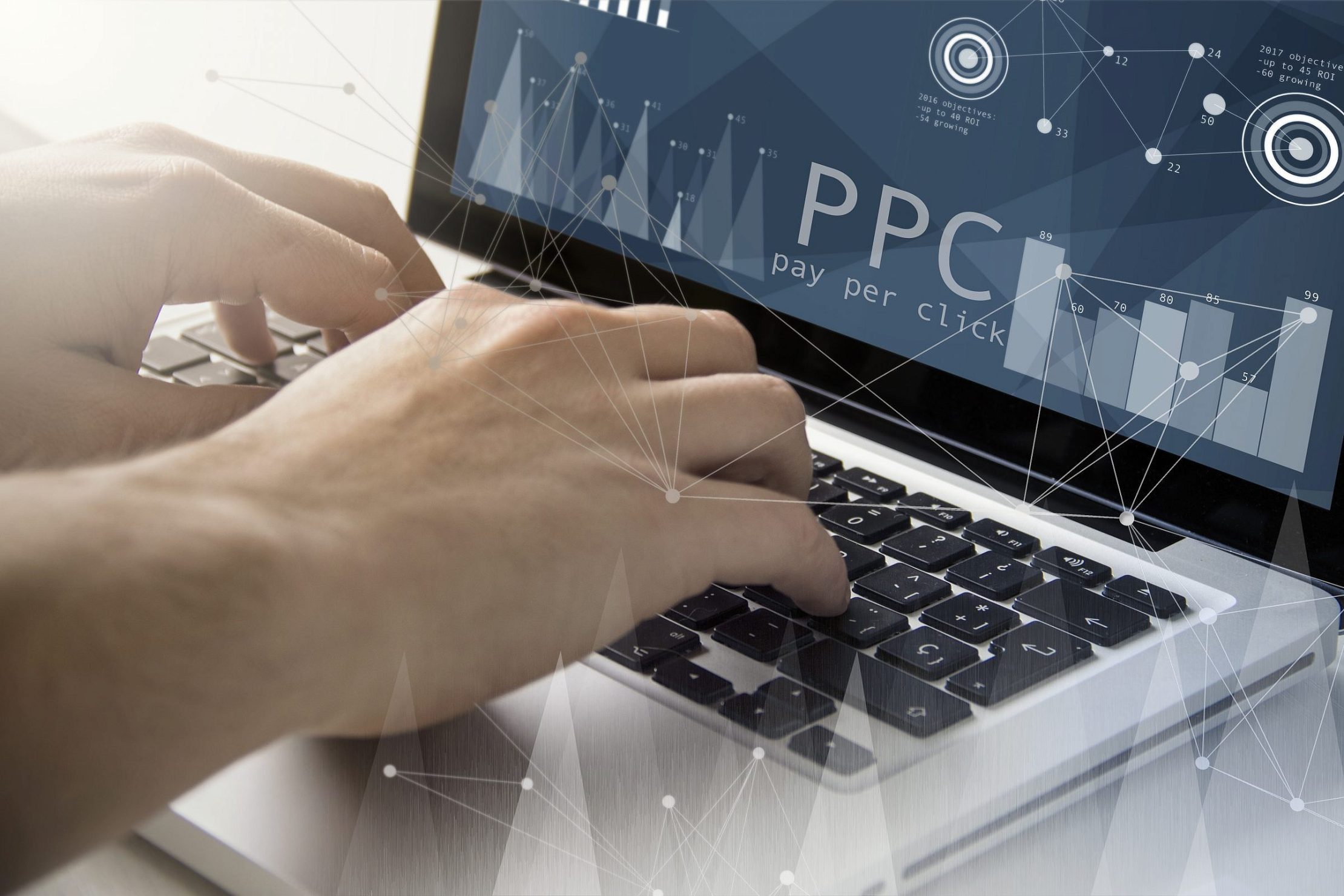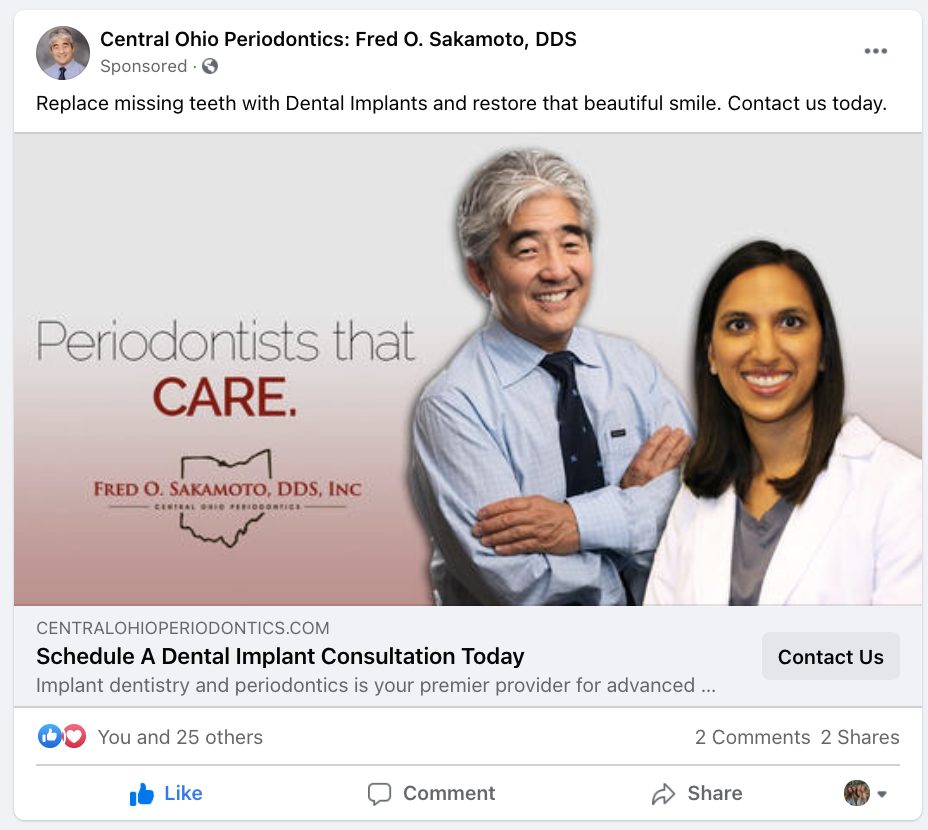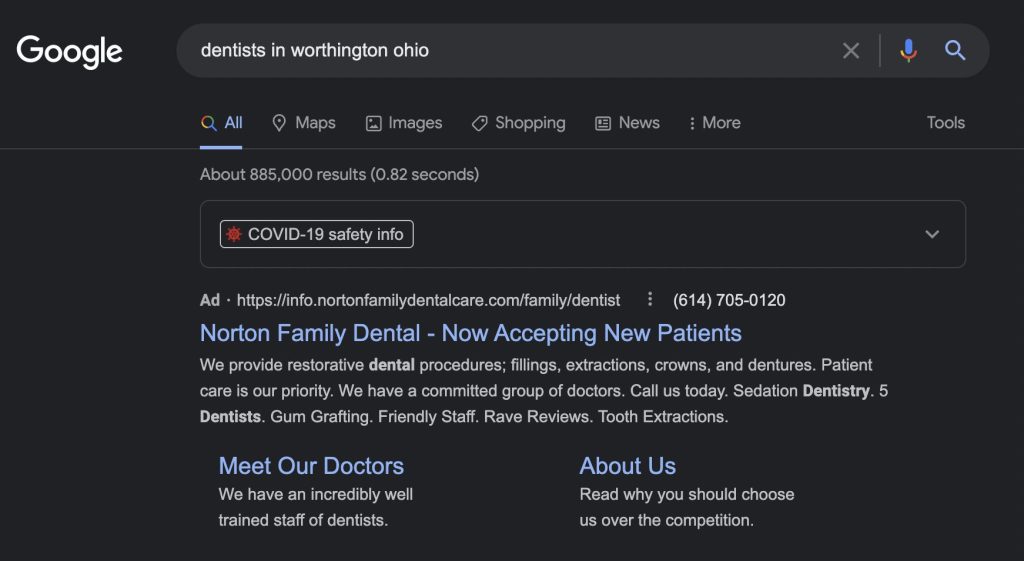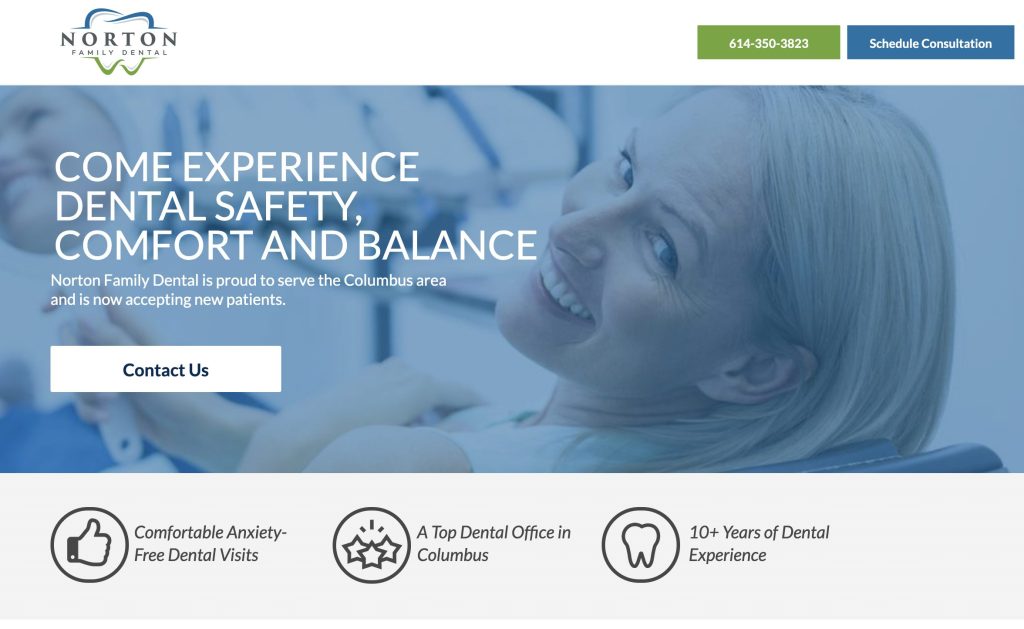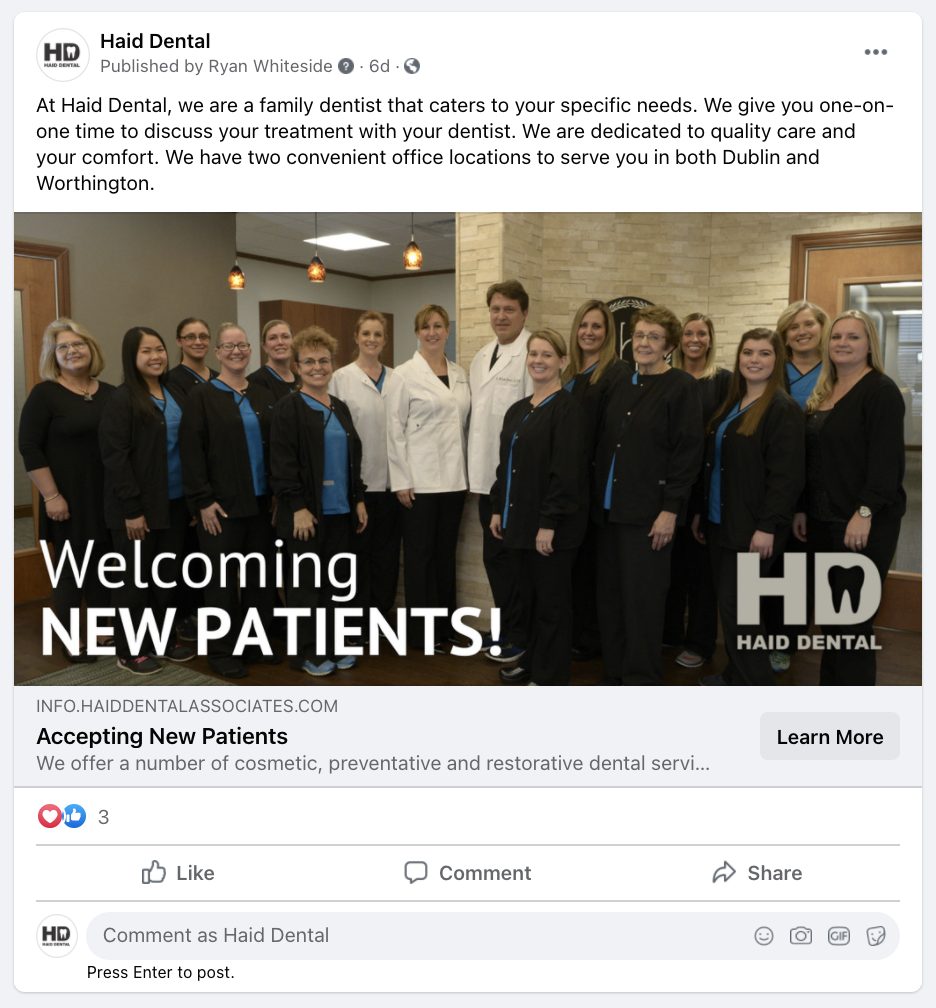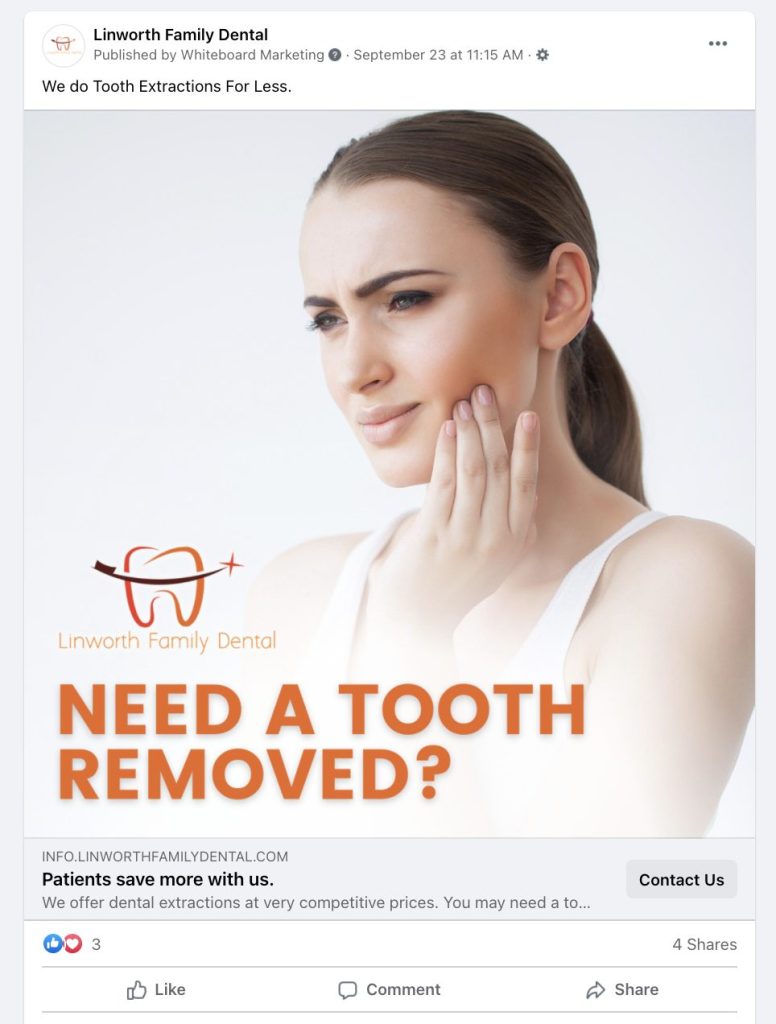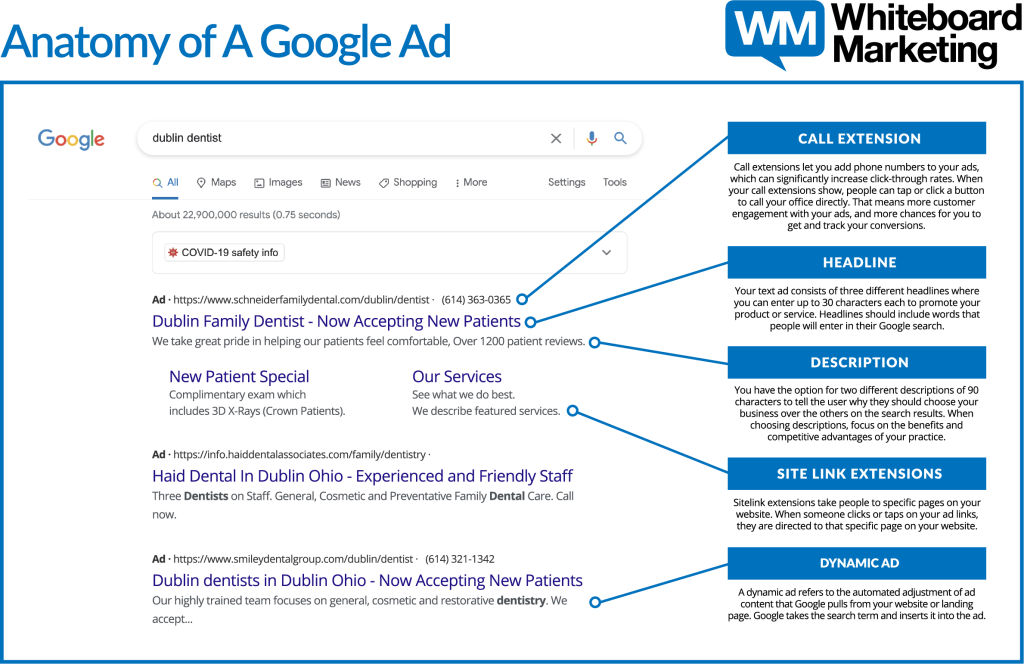Advertising is a necessity when marketing your dental practice, but how do you decide which platforms to use when targeting new patients? Google Pay-Per-Click (PPC) and Facebook Ads are two of the most common and effective forms of paid marketing on the Internet. Currently in 2021, Facebook has nearly 3 billion active monthly users, and Google has approximately 5.6 billions searches a day.
However, does one work better than the other? Or is your success dependent on what you’re trying to accomplish with your ads? Below, we outline the major differences between Google and Facebook PPC, examples of good content for the different ads and how to effectively use your advertising budget.
What Is Pay-Per-Click Advertising?
Pay-per-click (PPC) is a type of advertising where every time your ad is clicked, you pay a preset fee. Paying for advertising like this gives you more opportunities to get your business in front of the specific audiences you want.
What Is Google PPC for Dentists?
Google PPC functions like an auction, where brands and businesses are bidding on certain keywords their targeted customers search for. Whoever bids the most money for those keywords, like “Dental implants in Columbus, Ohio,” will show up in the paid ad section at the top of a Search Engine Results Page:
What Is Facebook PPC for Dentists?
For Facebook Ads, instead of bidding on keywords people are searching for, you utilize the Facebook Ads Manager and Facebook pixel. Facebook Ads Manager provides a simple, step-by-step process where you can build your ad, set your budget and campaign schedule and even build a specific audience to whom you want your ad to appear.
Pull Marketing versus Push Marketing
Both Facebook and Google PPC are forms of paid advertising, but they accomplish two different goals. Google PPC is a form of pull marketing, and Facebook PPC is a form of push marketing.
Google PPC: Pull Marketing
Pull marketing targets Google searchers who have intent, which means they are trying to find a specific service or product. Instead of casually browsing the Internet with no intention to purchase, these users are actively seeking something out.
For example, if a user searches “Dentists in Worthington, Ohio,” they have a clear intent: to find a new dentist in their community. Google PPC ads target these users by showing them advertisements for specific dentists in the area, like this:
Clicking this advertisement will then take users to a specially-designed page where they can quickly learn about the practice, explore services and book an appointment:
With pull marketing like Google PPC, the messaging creates an urgency or tries to solve a problem that a user already has.
High levels of strategy go into Google PPC and pull marketing because it requires keyword research and bidding. This includes using Google Trends, which shows you what users are searching for in specific markets, and SEMrush, which can be used for competitive analysis and seeing what your competition is doing in terms of keywords and advertising.
Facebook PPC: Push Marketing
It’s estimated the average person sees between 6,000 and 10,000 advertisements a day. This is due to the rise of social media advertising, which is a form of push marketing.
Push marketing targets users who are not actively looking for a product or service, but passively scrolling through a website or social media platform. Usually, these advertisements will showcase a specific service or attribute a business is trying to push, like this advertisement for a dentist accepting new patients:
For push marketing like Facebook PPC, the messaging is more casual, suggesting a product to a user who may be interested or have a mild need for a service. When creating Facebook PPC ads for our clients, we are very selective and promote a service, promotion or product that differentiates them from the competition. For example, this PPC ad shows a dentist’s low prices for tooth extractions:
Think of push marketing as driving down the highway and seeing a billboard for a specific product or service. You weren’t actively seeking that product or service out, but now that your interest is piqued, you may end up further exploring it.
Do I Spend My Advertising Money on Google PPC or Facebook PPC?
How you spend your PPC budget depends on what your goals are. If you have a high demand or ambitious goal, like to grow your business quickly, paid search is the right move for you. If you have a special service you want to promote to your community that doesn’t require much urgency, social advertising is the right move.
Google PPC Budget
Say you are a dentist and you want to get 10 new patients a month, but have a limited PPC advertising budget of $1,000 a month. In this case, paid search and Google PPC is the best for you because these ads directly target potential patients who have an urgent need for your services.
Facebook PPC Budget
Facebook PPC, on the other hand, is good for a dentist who wants to promote their practice and unique services. During this time of year, dentists will run “Use It or Lose It” campaigns to remind patients of extra money and dental benefits they have left in their health savings account. This kind of content is good for social advertising as it reminds users about a service, but doesn’t require much urgency.
Additionally, Facebook is an excellent space to run advertisements for special services like Botox and Invisalign. Google gives preferential treatment to name-brands for paid search, so it is nearly impossible for a practice to compete for those keywords. However, on Facebook, a practice can run PPC advertisements for either service.
Creating Effective Google and Facebook Ads
Google Ads
For Google PPC, the success lies in your copy. Make sure that your copy includes your keywords and strategically targets the demographics you want to attract to your practice. You’ll want to include headlines featuring words people are searching on Google, descriptive copy that focuses on the competitive advantages of your practice and your call extension number.
Facebook Ads
On average, a Facebook user will click on 11 ads per month. The trick to push marketing and Facebook PPC is making sure your advertisement is one of them. For our clients at Whiteboard Marketing, we’ve seen success in our Facebook PPC ads by adhering to the following:
- Since Facebook is a visual platform, use a graphic to catch a user’s attention.
- Our clients see much higher success with organic, or in-office photos, of a practice than with stock photos.
- No more than 20% of the image should be covered by text.
- Keep your headline short, concise and easy to read in a matter of seconds.
- Keep your body text under 125 characters.
Conclusion: Is Google PPC or Facebook PPC Better for Your Dental Practice Advertising Strategy?
Neither form of advertisement is inherently “better” than the other — it just depends on what you want to accomplish with your advertising. Instead of asking which form of PPC is better, ask which form of PPC is better for you and your goals. Are you looking to actively grow your patient base by attracting people who are already looking for a new dentist? Google PPC is the best fit for you. Are you trying to promote a special service you offer at your practice, like Botox or clear aligners? Try Facebook PPC for your advertising strategy.
Looking for Help With Your PPC Spending and Strategy?
Whiteboard Marketing carefully evaluates and researches all PPC opportunities for our clients, including weekly keyword optimization. For assistance with your dental practice advertising strategy, check out our How to Improve Your Google Ads worksheet or contact us at info@whiteboard-mktg.com.
Written by Anna L. Davies, Digital Marketing Specialist at Whiteboard Marketing, with assistance from Michelle Yeauger, Pay-Per-Click Specialist at Whiteboard Marketing.
